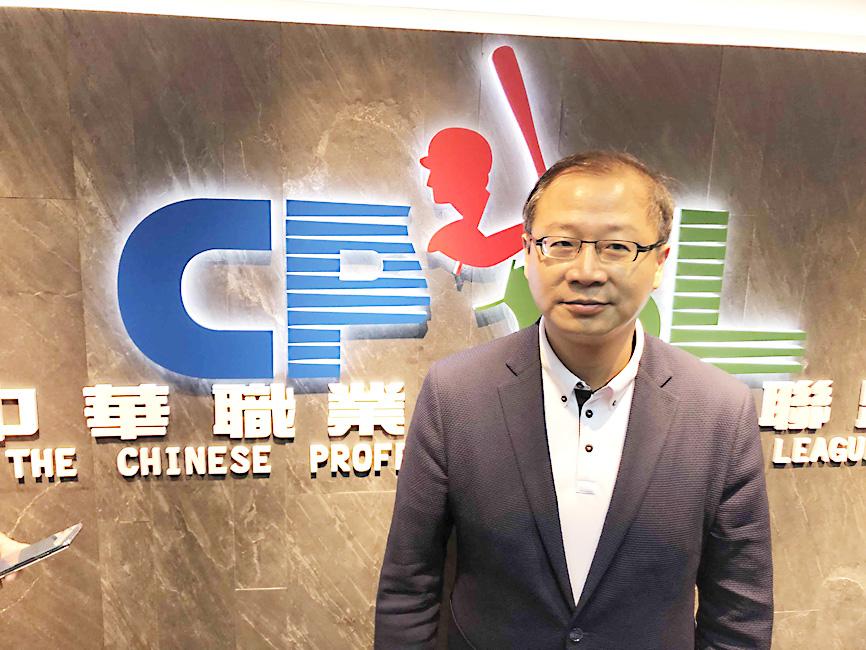The New Power Party (NPP) yesterday urged the CPBL to consider changing its title to avoid misunderstandings and to increase the exposure of the nation’s professional baseball games.
The party, which has also been asking the government to change the name of China Airlines Ltd (中華航空), raised the issue of CPBL’s name after the world’s first baseball season opener was played in Taiwan amid the COVID-19 pandemic.
No fans were allowed to watch the games at the ball parks.

Photo: CNA
“Because of the pandemic, games hosted by the CPBL have so far attracted millions of spectators from around the world. However, Jeffrey Bellone, a sports columnist in FanSided, has erroneously called the league ‘China Professional Baseball League,’” the NPP said on its Facebook page.
China’s professional baseball league, the China National Baseball League, was founded last year.
“It is little wonder that people were confused by these two leagues, because one has ‘Chinese’ in its title and the other one has ‘China.’ Do we really want to see people around the world calling our baseball players ‘Chinese baseball players?’” the NPP said.
Although the CPBL is a private organization, it received government funding after it was hit by game-fixing scandals, and fans have supported the league, despite the merger of two baseball leagues and multiple team ownership changes, it said.
Baseball should be considered a public asset, because people have equated the sport with national image and identity, rather than perceiving it as just a sport, the party added.
“The CPBL should quickly hear and integrate opinions on this matter from all stakeholders, and it should consider this matter from the perspective of raising the publicity of the nation’s professional baseball culture. The government, on the other hand, should explicitly express its position on this matter,” it said.
CPBL commissioner John Wu (吳志揚) last week said that the league is a private organization, adding that it is only the English-language name that is causing confusion.
“The country’s official title is the ‘Republic of China,’ so our name in Chinese does not cause any problems. This name carries 31 years of history, and we have to consider the necessity and efficacy of the name change campaign. This could potentially change our relations with the Sports Administration and international baseball organizations,” he said.

Right-wing political scientist Laura Fernandez on Sunday won Costa Rica’s presidential election by a landslide, after promising to crack down on rising violence linked to the cocaine trade. Fernandez’s nearest rival, economist Alvaro Ramos, conceded defeat as results showed the ruling party far exceeding the threshold of 40 percent needed to avoid a runoff. With 94 percent of polling stations counted, the political heir of outgoing Costa Rican President Rodrigo Chaves had captured 48.3 percent of the vote compared with Ramos’ 33.4 percent, the Supreme Electoral Tribunal said. As soon as the first results were announced, members of Fernandez’s Sovereign People’s Party

MORE RESPONSIBILITY: Draftees would be expected to fight alongside professional soldiers, likely requiring the transformation of some training brigades into combat units The armed forces are to start incorporating new conscripts into combined arms brigades this year to enhance combat readiness, the Executive Yuan’s latest policy report said. The new policy would affect Taiwanese men entering the military for their compulsory service, which was extended to one year under reforms by then-president Tsai Ing-wen (蔡英文) in 2022. The conscripts would be trained to operate machine guns, uncrewed aerial vehicles, anti-tank guided missile launchers and Stinger air defense systems, the report said, adding that the basic training would be lengthened to eight weeks. After basic training, conscripts would be sorted into infantry battalions that would take

GROWING AMBITIONS: The scale and tempo of the operations show that the Strait has become the core theater for China to expand its security interests, the report said Chinese military aircraft incursions around Taiwan have surged nearly 15-fold over the past five years, according to a report released yesterday by the Democratic Progressive Party’s (DPP) Department of China Affairs. Sorties in the Taiwan Strait were previously irregular, totaling 380 in 2020, but have since evolved into routine operations, the report showed. “This demonstrates that the Taiwan Strait has become both the starting point and testing ground for Beijing’s expansionist ambitions,” it said. Driven by military expansionism, China is systematically pursuing actions aimed at altering the regional “status quo,” the department said, adding that Taiwan represents the most critical link in China’s

‘REALLY PROUD’: Nvidia would not be possible without Taiwan, Huang said, adding that TSMC would be increasing its capacity by 100 percent Nvidia Corp CEO Jensen Huang (黃仁勳) on Saturday praised and lightly cajoled his major Taiwanese suppliers to produce more to help power strong demand for artificial intelligence (AI), capping a visit to the country of his birth, where he has been mobbed by adoring fans at every step. Speaking at an impromptu press conference in the rain outside a Taipei restaurant, where he had hosted suppliers for a “trillion-dollar dinner,” named after the market capitalization of those firms attending, Huang said this would be another good year for business. “TSMC needs to work very hard this year because I need a lot